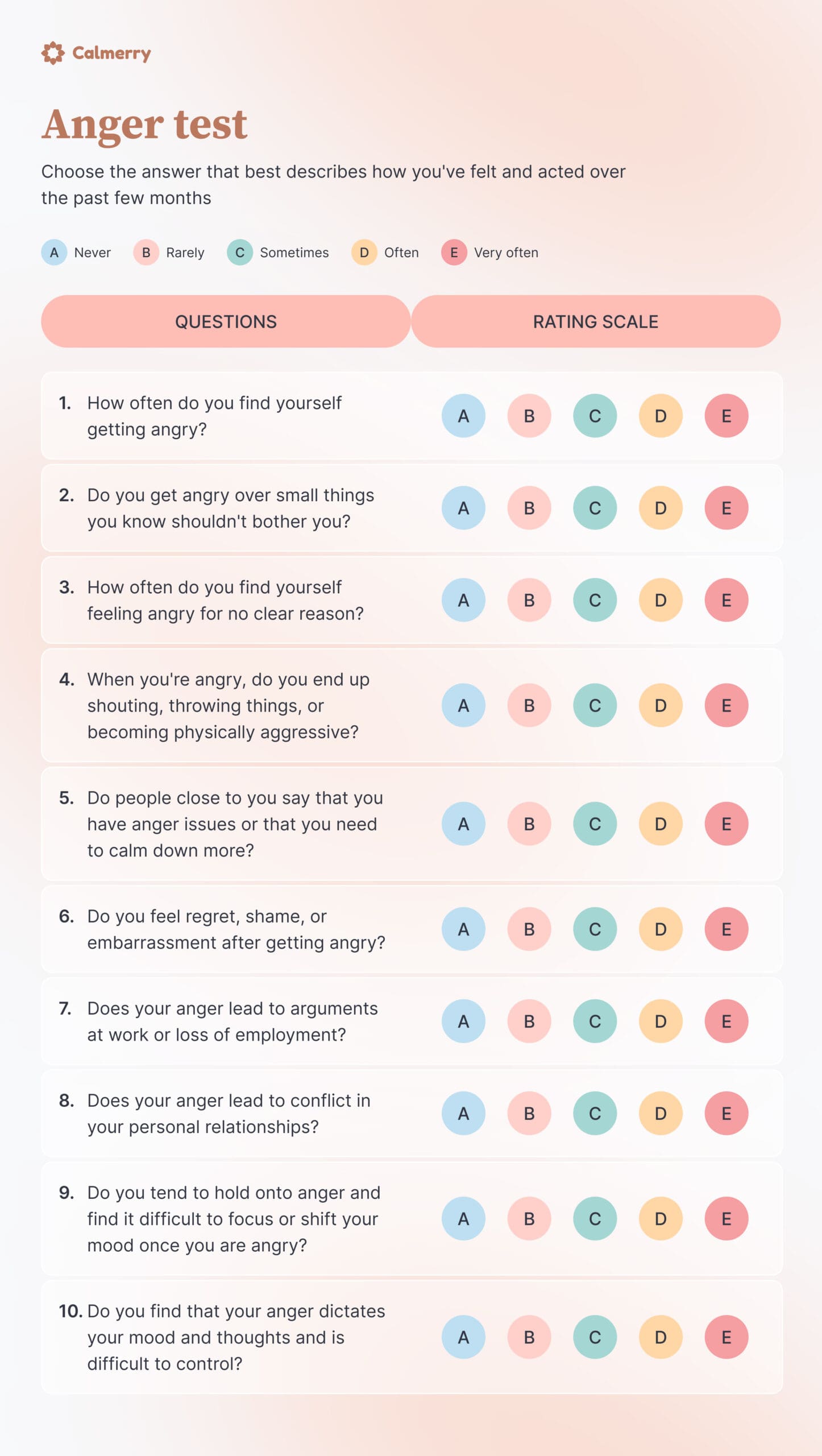Anger Issues Test: Take This Quiz to Understand Your Emotions

In this article
Anger is defined as a strong feeling of displeasure or antagonism, usually in response to an injustice, threat, or frustration. Anger can range from mild annoyance to extreme rage.
Everyone gets angry sometimes, and it is a normal and healthy emotion, but how you deal with anger can make a big difference in your life.
If you frequently feel frustrated, snap at others, or feel out of control, it might be time to take a closer look at your anger.
Our quiz is designed to help you reflect on your anger and its impact on your life. This isn’t a professional diagnosis, but it can be a helpful step in understanding your emotions and starting to manage them better.
Who is this quiz for?
This quiz is for anyone who feels that anger might be affecting their relationships, work, or overall happiness. It’s a way to start thinking about how you handle anger and what you might want to change.
How to take the quiz
For each question, choose the answer that best describes how you’ve felt and acted over the past few months. There’s no right or wrong answer, just go with what feels true for you.

Anger test
1) How often do you find yourself getting angry?
A. Never
B. Rarely
C. Sometimes
D. Often
E. Very often
2) Do you get angry over small things you know shouldn’t bother you?
A. Never
B. Rarely
C. Sometimes
D. Often
E. Very often
3) How often do you find yourself feeling angry for no clear reason?
A. Never
B. Rarely
C. Sometimes
D. Often
E. Very often
4) When you’re angry, do you end up shouting, throwing things, or becoming physically aggressive?
A. Never
B. Rarely
C. Sometimes
D. Often
E. Very often
5) Do people close to you say that you have anger issues or that you need to calm down more?
A. Never
B. Rarely
C. Sometimes
D. Often
E. Very often
6) Do you feel regret, shame, or embarrassment after getting angry?
A. Never
B. Rarely
C. Sometimes
D. Often
E. Very often
7) Does your anger lead to arguments at work or loss of employment?
A. Never
B. Rarely
C. Sometimes
D. Often
E. Very often
8) Does your anger lead to conflict in your personal relationships?
A. Never
B. Rarely
C. Sometimes
D. Often
E. Very often
9) Do you tend to hold onto anger and find it difficult to focus or shift your mood once you are angry?
A. Never
B. Rarely
C. Sometimes
D. Often
E. Very often
10) Do you find that your anger dictates your mood and thoughts and is difficult to control?
A. Never
B. Rarely
C. Sometimes
D. Often
E. Very often
How to understand your results
If you chose “Often” or “Very often” for many questions, it’s a sign that anger is having a big impact on your life. Talking to a professional could help you learn ways to handle these feelings and reactions better.
If your answers are mostly “Never,” “Rarely,” or “Sometimes,” your anger might not be a big issue. Still, if some answers worry you, or you want to learn to explore and manage your anger better, getting some advice could be useful.
Is this quiz accurate?
Like any self-assessment, this quiz isn’t a substitute for professional advice. But it does use common signs of problematic anger to help you see where you’re at.
If you find the results striking a chord, it might be a good idea to talk to a professional who can give you more personalized help.
Next steps after the test
If your results suggest that anger is a problem for you, or if you just want to improve, reaching out for help can make a big difference.
A mental health professional can work with you to:
- Find better ways to express your anger
- Understand what triggers your anger
- Explore the emotions behind your anger
- Teach stress management techniques to prevent triggers from overwhelming you.
- Improve how you communicate when you’re upset
- Address any underlying mental health issues such as anxiety, depression, or trauma that may contribute to anger problems.
Therapy can be an exciting journey about growing and learning why you feel the way you feel. At Calmerry, we’re here to help you do just that. We match you with an experienced therapist who fits your needs within 1 hour.
online therapy
live video session



